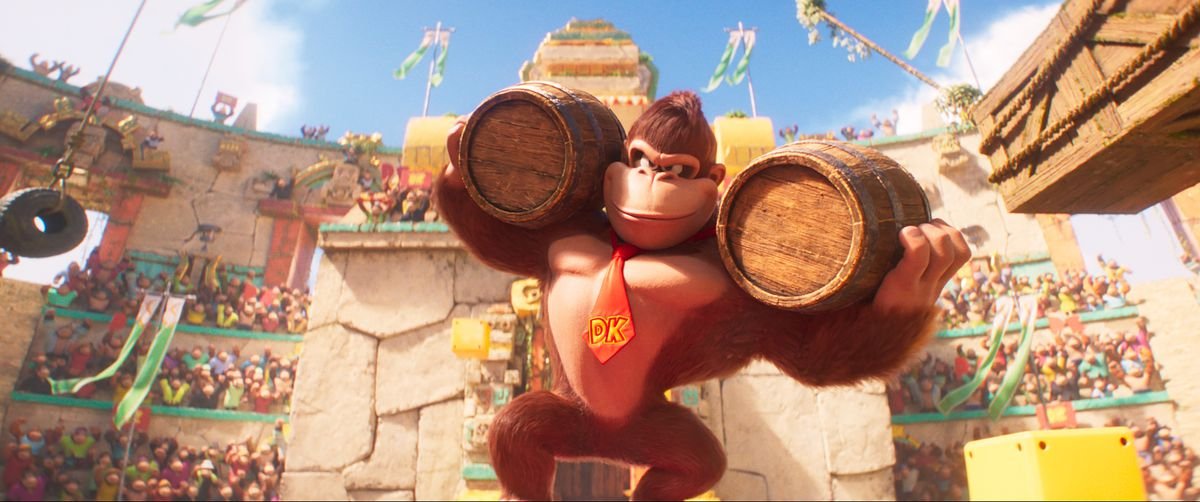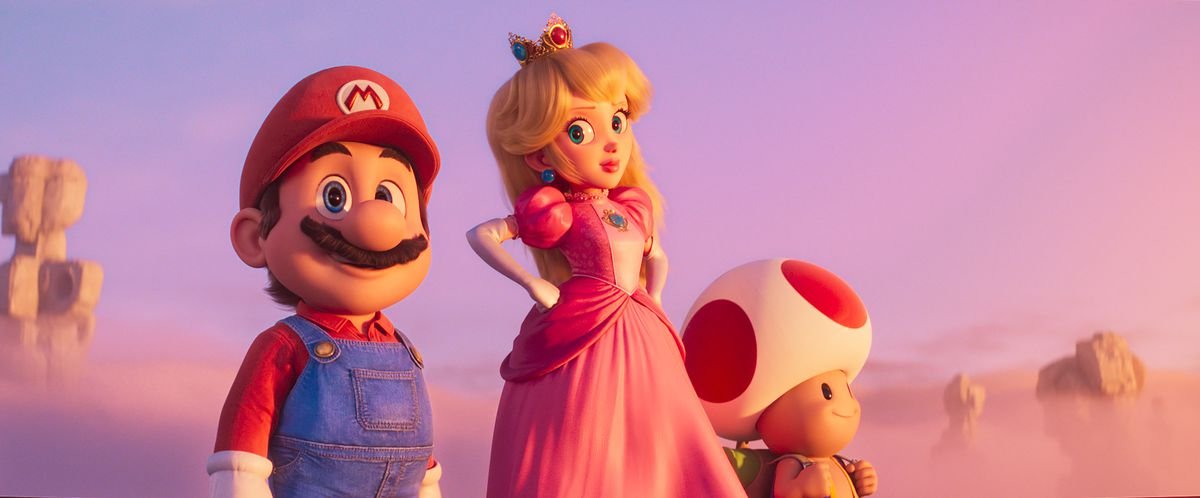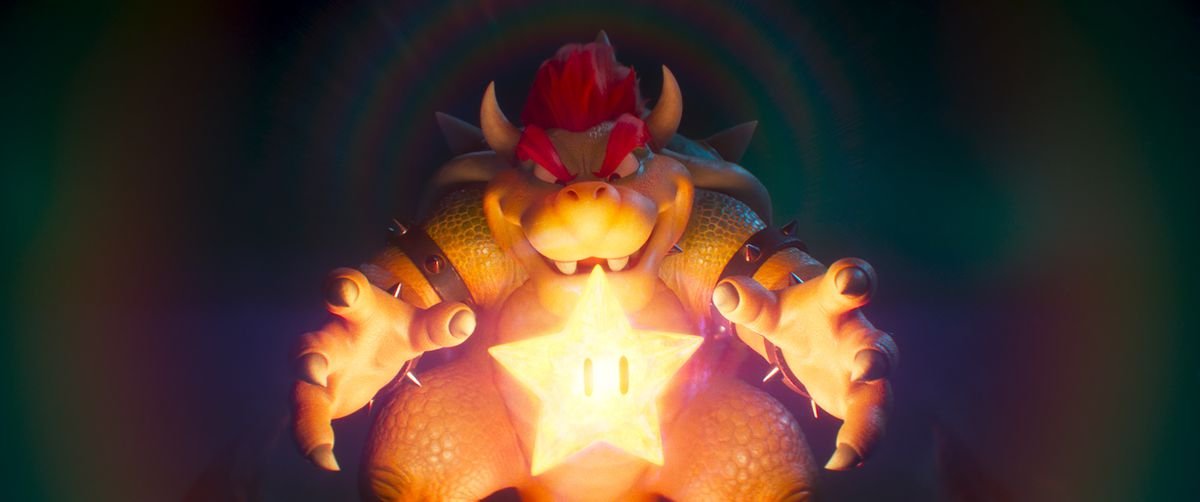In the world of video games, you can always count on Mario. Nintendo’s mascot is a cheery plumber whose can-do attitude and penchant for jumping has made him an avatar for all kinds of family fun: charming games of skill where you hop over monsters and obstacles to reach a flag and save a princess, chaotic racing games where sabotage is more important than driving, and sports games that somehow appeal both to people who love sports and to those who would rather die than turn on ESPN. It isn’t that much of a stretch to say that there is no such thing as a bad Mario game. There’s a perfect Mario game for nearly every kind of person — which gives the little plumber and his endless incarnations the sort of magical appeal that every modern movie franchise is desperate for.
Illumination’s animated adventure The Super Mario Bros. Movie attempts to bottle that appeal, but mostly just ends up referencing it. Directed by Teen Titans Go! creators Aaron Horvath and Michael Jelenic, with a script by Minions: The Rise of Gru and The Lego Movie 2 co-writer Matthew Fogel, The Super Mario Bros. Movie feels like it’s made to be screenshotted more than watched. Nearly every frame is packed with a dizzying number of Easter eggs and references to Mario games and other Nintendo franchises. Cataloging them all might be the most enjoyable way to watch the movie, because when it comes to regular movie things like plot and character, well, all that gets blue-shelled to hell. (If you got that reference, you’ll probably like this movie more than the average viewer.)
A portal fantasy (pipe dream?) squarely aimed at younger audiences, The Super Mario Bros. Movie introduces Mario (Chris Pratt) and Luigi (Charlie Day), two brothers from Brooklyn who dream of getting their independent plumbing business off the ground. Unfortunately, they haven’t bagged a single client yet, making them a laughingstock to the neighborhood and a disappointment to their family. Desperate to prove themselves, the self-styled “Super Mario Bros.” try to fix a neighborhood water main break, but get sucked through a strange green pipe that warps them both into the colorful world of the Mario video games.
Trouble is, Mario and Luigi warp to very different places: Mario lands in the idyllic Mushroom Kingdom, populated by mushroom-headed folk called Toads (the main one voiced by Keegan-Michael Key) and led by the human Princess Peach (Anya Taylor-Joy). But Luigi warps right into the clutches of Bowser (Jack Black), the king of the turtlelike Koopas, who’s on a mission to conquer the Mushroom Kingdom. Hoping to rescue his brother, Mario teams up with Peach on a journey to ask Cranky Kong (Fred Armisen) for permission to bring Donkey Kong (Seth Rogen) and the Kong Army into the fight against the Koopas.

Image: Nintendo, Illumination/Universal Pictures
It’s a breezy plot that’s mostly meant to take viewers on a scenic tour of Mario locales, with some slapstick along the way. Illumination’s rendering of Nintendo’s worlds and characters, as imagined by legendary game designer Shigeru Miyamoto, is overwhelmingly gorgeous and painstakingly faithful, packing every corner of the screen with something interesting to look at. Everything else about the movie is serviceable, with frustratingly brief moments of idiosyncrasy that would arguably make The Super Mario Bros. Movie a more memorable film.
The comedy is big on pratfalls from cute creatures, but also has the baffling and bizarre inclusion of a Luma, an adorable star-shaped creature that yearns for oblivion, and that gets big laughs out of lines about despair and death that are guaranteed to sound even creepier when kids start repeating them. When The Super Mario Bros. Movie veers into action — which happens often — the scenes vacillate between generic superhero-style fights and dazzlingly inventive set-pieces that blend ambitious CG animation with 2D video game homage.
Reverence is the goal here, haunted perhaps by the ghost of 1993’s Super Mario Bros., a legendary live-action boondoggle that pleased neither Nintendo, nor its fans, nor filmgoers with its weird, dystopian take on the plucky plumbers’ journey through the Mushroom Kingdom. (Even if it has slowly crept toward cult-favorite status in the intervening 30 years.) This new take on Mario is so faithful in its efforts to recreate iconography from four decades of video games that there’s almost no energy left to expend on reaching the unconverted. The Super Mario Bros. Movie is a sermon for the Nintendo faithful and their children, and few others.

Image: Nintendo, Illumination/Universal Pictures
There’s been a lot of anxiety about the vocal performances in The Super Mario Bros. Movie, and it’s all ultimately for naught. Most of them — especially Chris Pratt as Mario — are serviceable, and frankly don’t make enough of an impression to linger in the mind or inspire children to imitate them, the way Charles Martinet’s iconic performance from the games has for years now. (Mario’s longtime voice actor has a few brief cameos easily spotted and heard by those looking for him.)
The major exception is Jack Black as Bowser. An ebullient presence on and off screen, Black brings an unmatched energy to The Super Mario Bros. Movie, resulting in a take on Mario’s nemesis that reads as both faithful to the games and original to the film. It’s the only part of the movie that legitimately feels collaborative between Illumination’s animators, Nintendo’s source material, and an actor’s performance, creating something that feels both familiar and new. (It’s also the source of one of the film’s best gags, a moment that’s hard to imagine anyone other than Black pulling off.)

Image: Nintendo, Illumination/Universal Pictures
The Super Mario Bros. Movie arrives in a cinematic landscape that frankly needs it. Major Hollywood studios are in search of dependable IP that comes with a baked-in audience — one that may thrill at the sight of a Nintendo production card, for example. And cinemas are, as ScreenCrush’s Matt Singer recently noted in a post that set off a major online kerfuffle, often bereft of theatrical releases for children. Who better to save the day than our trusty pal Mario, with his astounding video game track record and impossible-to-hate overalls?
But the point of Mario is that he can do anything. He’s a license to play in a world that demands we take so many things seriously. For Mario, reverence feels wrong, and antithetical to the boundless feeling that comes when his familiar themes play through the speakers. There’s a bit of poetry to why Mario’s iconic movement is a jump: When you’re at play and your feet leave the ground, for the briefest moment, it feels like anything can happen. All it takes is a little imagination. The Super Mario Bros. Movie has none.
The Super Mario Bros. Movie premieres in theaters on April 5.

















































